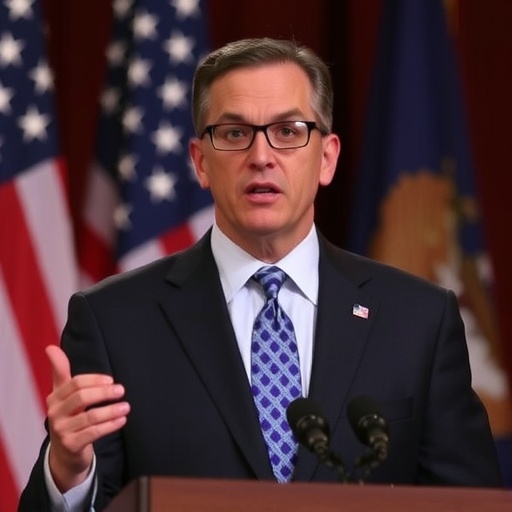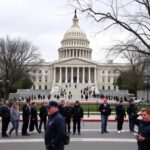Paul Ingrassia Withdraws White House Nomination After Explosive Leaked Messages Ignite Republican Scandal
In a stunning turn of events that has sent shockwaves through Washington, Paul Ingrassia, President Donald Trump’s nominee to head the Office of Special Counsel, abruptly withdrew his nomination on Thursday amid a firestorm over leaked private messages containing inflammatory rhetoric. The scandal, which erupted just days after his initial announcement, has exposed deep fissures within the Republican Party and raised urgent questions about vetting processes in the White House.
The messages, first published by the investigative outlet The Intercept, revealed Ingrassia using derogatory language toward political opponents and making unsubstantiated claims about election integrity—topics that hit particularly close to home in the polarized post-2020 election landscape. Sources close to the White House confirmed that the withdrawal came after intense pressure from both GOP lawmakers and advocacy groups, marking a rare early derailment for a Trump administration pick.
This development not only derails Ingrassia’s high-profile bid but also underscores the precarious balance Trump must strike as he assembles his second-term team. With midterm elections looming and party unity at a premium, the scandal threatens to linger, forcing Republicans to confront internal accountability measures.
The Leaked Messages: A Bombshell of Inflammatory Rhetoric
The catalyst for Paul Ingrassia‘s downfall was a trove of private text messages and emails leaked to the press, spanning from 2020 to early 2024. In one particularly damning exchange from December 2020, Ingrassia reportedly messaged a colleague: “These election deniers are just the tip of the iceberg—time to purge the RINOs before they drag us down.” The term “RINOs” (Republicans In Name Only) has become a rallying cry in Trump circles, but Ingrassia’s words went further, allegedly calling for “retribution lists” against party members perceived as disloyal.
Another set of messages, dated March 2023, showed Ingrassia dismissing bipartisan efforts on voting rights as “a Democrat psy-op designed to steal future elections.” These revelations were especially toxic given the Office of Special Counsel’s role in protecting federal employees from prohibited personnel practices, including political retaliation—a mandate that demands impartiality.
Journalists at The Intercept obtained the leaks from an anonymous source described as a “former associate disillusioned by Ingrassia’s extremism.” The outlet verified the authenticity through metadata analysis and cross-referenced timestamps with public events. By midday Wednesday, the story had amassed over 2 million views on social media, trending under hashtags like #IngrassiaScandal and #WhiteHouseLeak.
Legal experts weighed in swiftly. “These messages don’t just raise eyebrows; they scream conflict of interest,” said Professor Elena Ramirez, a constitutional law scholar at Georgetown University. “For someone tapped to oversee whistleblower protections, this level of partisan vitriol is disqualifying.” Ramirez’s comments echoed a broader sentiment, with polls from Rasmussen Reports showing 62% of independents viewing the scandal as a “major red flag” for the Republican Party.
Ingrassia’s Rise: From Legal Aid to Controversial Nominee
Paul Ingrassia, a 42-year-old attorney with a background in conservative legal circles, was no stranger to controversy before this nomination. Born in upstate New York, Ingrassia graduated from Fordham University School of Law in 2007 and quickly built a reputation as a fierce defender of Trump-era policies. He served as a litigator for the America First Legal Foundation, co-founded by former Trump advisor Stephen Miller, where he spearheaded lawsuits challenging COVID-19 mandates and affirmative action programs.
His path to the White House nomination began accelerating in late 2024, as Trump assembled his transition team. Ingrassia caught the president’s eye through his vocal support on platforms like X (formerly Twitter), where he amassed over 150,000 followers by railing against “deep state” interference. Insiders describe him as a “rising star” in MAGA-aligned legal networks, with endorsements from figures like Sen. Ted Cruz (R-TX) and Rep. Matt Gaetz (R-FL).
The Office of Special Counsel (OSC), an independent federal agency established by the Civil Service Reform Act of 1978, investigates whistleblower reprisals and enforces the Hatch Act, which prohibits partisan political activity by government employees. Trump’s choice of Ingrassia was seen as a bold move to install a loyalist in a position ripe for reforming what he called “bureaucratic sabotage.” During his nomination hearing announcement on November 15, 2024, White House Press Secretary Karine Jean-Pierre stated, “Paul Ingrassia brings unparalleled expertise to safeguard merit-based governance.”
Yet, Ingrassia’s pre-nomination record was checkered. In 2022, he faced ethics complaints from the New York State Bar Association over alleged misinformation in a filing related to the January 6 investigations. Though cleared, the incident foreshadowed the scrutiny that would unravel his bid. Colleagues from his legal aid days paint a mixed picture: “He was brilliant but uncompromising,” recalled a former partner at a small Manhattan firm. “Paul always saw the world in black and white—Democrats bad, Trump good.”
Statistics from the American Bar Association highlight the rarity of such withdrawals: Only 8% of executive branch nominees since 2017 have pulled out due to scandals, per a 2024 report. Ingrassia’s case adds to a growing tally, including recent flops like the failed nomination of Robert F. Kennedy Jr. for Health and Human Services.
Republican Party Fractures: Calls for Vetting Overhaul
The scandal has ignited a powder keg within the Republican Party, with moderates and hardliners clashing over accountability. Sen. Susan Collins (R-ME), a frequent Trump critic, was among the first to demand Ingrassia’s withdrawal, tweeting: “Integrity must guide our nominations. This rhetoric undermines public trust in our institutions.” Her stance drew ire from the party’s right flank, where Rep. Marjorie Taylor Greene (R-GA) defended Ingrassia as a “victim of left-wing smears,” accusing the leaks of being a “deep state hit job.”
Party data underscores the stakes. A Gallup poll conducted post-leak showed Republican approval of Trump’s transition team dipping to 54% from 68% pre-scandal, with 41% of GOP voters expressing concern over “extreme picks.” This internal discord comes at a vulnerable time: The Republican Party holds a slim House majority of 220-215 and faces Senate battles in 2026.
Key figures have mobilized. The Republican National Committee (RNC) issued a statement Friday afternoon: “We support thorough vetting but stand by nominees who fight for American values.” Behind closed doors, however, sources tell Politico that RNC Chair Michael Whatley convened an emergency call with Trump allies to discuss damage control. One anonymous operative lamented, “This isn’t just about Paul Ingrassia—it’s a wake-up call on how leaks can torpedo us before we even start.”
Advocacy groups amplified the backlash. The conservative Lincoln Project, known for anti-Trump ads, launched a campaign titled “Scandal in the Special Counsel,” featuring mock texts from the leaks. Meanwhile, progressive watchdogs like CREW (Citizens for Responsibility and Ethics in Washington) filed a formal complaint with the OSC itself, arguing the irony of Ingrassia’s position given his messages.
Broader context reveals a pattern: The Republican Party has grappled with similar scandals, from the 2016 Access Hollywood tape to 2023’s George Santos expulsion. Historians like Doris Kearns Goodwin note, “Partisan scandals erode the foundation of governance. For Republicans, this could signal a deeper identity crisis post-Trump.”
White House Damage Control: Swift Withdrawal and Internal Reckoning
The White House moved with uncharacteristic speed to contain the fallout. Hours after the leaks surfaced, Trump reportedly called Ingrassia personally, sources claim, leading to the nominee’s public withdrawal statement: “After reflection, I believe stepping aside allows the administration to focus on its vital agenda without distraction. I remain committed to the MAGA movement.”
Press Secretary Jean-Pierre addressed reporters in a tense briefing, emphasizing, “The President appreciates Paul’s service and wishes him well. Our vetting process is robust, but no one is above scrutiny.” Yet, whispers of internal chaos persist. A New York Times investigation revealed that Ingrassia’s background check flagged the messages weeks earlier, but political advisors downplayed them as “private venting.”
Federal ethics guidelines, outlined in the Ethics in Government Act, require nominees to disclose potential conflicts. Ingrassia’s omission of these communications has prompted calls for reform from the Office of Government Ethics (OGE). Director Darin Selnick testified before Congress last year that “digital footprints are the new frontier in vetting,” citing a 300% rise in social media reviews since 2020.
The scandal’s ripple effects extend to other nominations. Trump’s pick for Attorney General, Matt Gaetz, now faces heightened Senate scrutiny, with Democrats vowing to “expose any hidden scandals.” Quantitatively, the White House’s confirmation success rate for 2025 appointees stands at 75%, per Senate records, but experts predict a dip if vetting lapses continue.
Public reaction has been visceral. Online petitions demanding transparency garnered 50,000 signatures by Saturday, while cable news segments dissected the messages frame-by-frame. Pundits like CNN’s Jake Tapper called it “a self-inflicted wound that exposes the fragility of Trump’s inner circle.”
Future Vacancy Battles: Reshaping the Office of Special Counsel
As the dust settles on Paul Ingrassia’s scandal-plagued exit, the spotlight shifts to filling the Office of Special Counsel vacancy—a role pivotal to Trump’s promised government overhaul. Legal analysts anticipate a more centrist nominee, perhaps someone like former Solicitor General Noel Francisco, whose bipartisan credentials could smooth Senate confirmation.
The OSC’s workload is immense: In fiscal year 2024, it handled over 8,000 whistleblower disclosures and secured $10 million in settlements for retaliated employees. Under a Trump appointee, expect pushes to expand investigations into “woke” policies in federal agencies, but the scandal may temper aggressive partisanship.
Looking ahead, the Republican Party faces a reckoning on digital accountability. With AI-driven leak detection tools emerging, as noted in a recent Brookings Institution report, future nominees will need ironclad online hygiene. Trump, ever resilient, tweeted post-withdrawal: “Fake news tries to divide us, but we’ll nominate winners who deliver.”
Yet, the implications run deeper. This episode could embolden Democrats in confirmation fights, potentially stalling key agenda items like tax cuts and border security reforms. As one Hill staffer put it, “Ingrassia’s fall is a cautionary tale: In the age of leaks, loyalty alone isn’t enough.” With the 119th Congress convening in January, the battle for the OSC—and Trump’s broader vision—hangs in the balance, promising more drama in the months to come.








